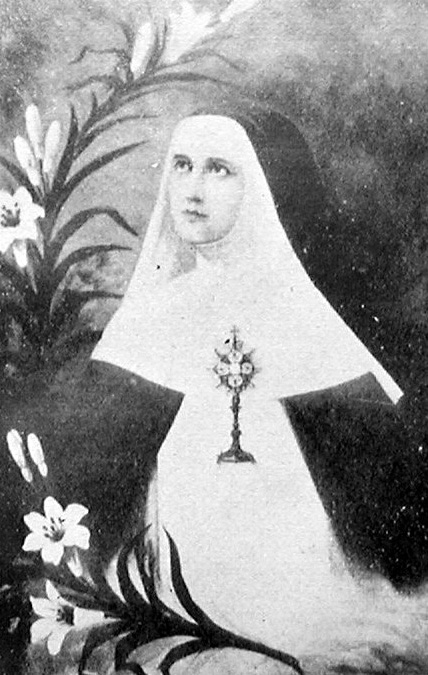Catalina de Jesús María Herrera Campusano, known as Sor Catalina de Jesús Herrera (Guayaquil, August 22, 1717 – September 29, 1795) was a revered Ecuadorian religious figure and a talented writer. She demonstrated an early affinity for learning, thanks to her mother’s guidance in reading, writing, and religious education. Catalina embarked on a profound spiritual journey that led her to the Monastery of Santa Catalina de Siena in Quito. There, she adopted the religious name “Catalina Luisa de Jesús, María y José” and dedicated her life to faith and contemplation. Her contributions extend beyond her religious devotion, as she left a lasting literary legacy through her autobiography, “Secretos entre el alma y Dios,” which was completed in 1760 and remains a source of inspiration for readers interested in her spiritual insights and reflections. Catalina de Jesús Herrera’s life and writings continue to be celebrated for their profound wisdom and devoutness.
Catalina de Jesús Herrera: A Pious Penwoman of Ecuador
In the annals of Ecuadorian literature and religious devotion, the name Catalina de Jesús Herrera shines brightly. Born on August 22, 1717, in Guayaquil, she is celebrated as Sor Catalina de Jesús Herrera, a revered religious figure and a gifted writer. Her life journey, rich with spiritual insights and intellectual pursuits, is a testament to her enduring legacy.
Early Life and Spiritual Awakening
Catalina de Jesús Herrera’s upbringing was marked by an early exposure to education and spirituality. Her mother, María Navarro Navarrete y Castro, played a pivotal role in her education, teaching her to read and write at the tender age of seven. A pivotal moment in her childhood was witnessing the birth of a child, which sparked her curiosity about the origins of life, humanity, and God’s creation. Her mother, in response to these inquiries, provided her with a comprehensive catechism, laying the foundation for her lifelong devotion to faith.
A Life of Intellectual Curiosity
Catalina de Jesús Herrera’s intellectual journey began with a thirst for knowledge. She avidly read books, with a particular fondness for “comedias,” as revealed in her writings. Over time, her reading expanded to include works by luminaries such as Saint Teresa of Jesus, Saint John of the Cross, and other mystical and moral theologians. Encouraged by her brother, a Dominican friar, she transitioned from frivolous reading to more profound works.
A Spiritual Odyssey to Quito
In 1741, Catalina de Jesús Herrera embarked on a transformative journey to Quito, where she entered the Monastery of Santa Catalina de Siena. Taking the religious name “Catalina Luisa de Jesús, María y José,” she embraced a life of devotion and contemplation. Her dedication to her faith was unwavering, and by 1745, she assumed the role of Maestra de Novicias, entrusted with the training of novices. By 1755, she had risen to the esteemed position of Madre Priora, a testament to her spiritual leadership.
A Life of Service and Leadership
Throughout her life, Sor Catalina de Jesús Herrera held various crucial roles within her monastery. She served as the depositaria, overseeing the monastery’s financial matters and later assuming the role of priora. Her dedication to her faith and her community remained constant until her passing on September 29, 1795, at the age of 78. She was laid to rest in the same convent where she had dedicated her life to her spiritual journey.
Literary Legacy and Autobiography
Catalina de Jesús Herrera’s literary contributions are a remarkable facet of her legacy. In 1747, she penned her first autobiography, titled “Secretos entre el alma y Dios.” However, she chose to burn this early work. Years later, under the guidance of her confessor, Fray Tomás Corrales, she embarked on a new endeavor, rewriting her autobiography. This profound work, initiated on February 8, 1758, and completed on August 29, 1760, provides insights into her monastic life, spiritual struggles, and delightful anecdotes.
Her writing style, characterized by simplicity and elegance, reflects the depth of her intellectual prowess and spiritual insight. Her prose is celebrated for its linguistic richness and structural solidity, making it a notable contribution to Ecuadorian colonial literature. Her writings, originally comprised of 30 handwritten booklets, were later published in 1895, on the centenary of her death, as part of the Biblioteca Ecuatoriana Mínima.
A Legacy of Spiritual Wisdom
In her writings, Catalina de Jesús Herrera offers readers a glimpse into her profound spiritual experiences. Her reflections on the divine, the human condition, and the mysteries of faith continue to inspire and resonate with those who explore her works. Her life, marked by devotion, intellectual curiosity, and literary accomplishments, has earned her the enduring status of “venerable” within the Catholic Church, a testament to the miracles and prophecies attributed to her.
In the heart of Ecuador, Catalina de Jesús Herrera’s life and writings continue to illuminate the path of faith and knowledge, reminding us of the profound wisdom that can be found within the pages of a devout writer’s works.

